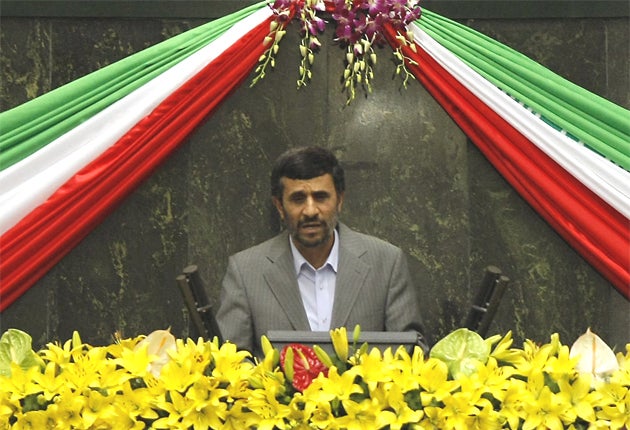TV blackout and boycott mar Ahmadinejad's swearing-in
Iranian President takes oath of office – but the cries of 'Death to the Dictator' can still be heard in Tehran

The man who is now formally Iran's President for the next four years cut an isolated figure as he took his oath of office yesterday. Mahmoud Ahmadinejad was sworn in for a second term at a ceremony boycotted by scores of parliamentarians, leading clerics and other important figures who would normally have been expected to attend.
Out on the streets demonstrators, many in black T-shirts to symbolise mourning, or wearing green, the colour of the campaign run by defeated opposition challenger Mirhossein Mousavi, marked what ought to have been a celebratory occasion by chanting "Death to the Dictator". Security forces had been deployed in massive numbers around the Iranian parliament where the swearing-in was taking place, as well as at the entrances to a number of key underground train stations and overpowered protesters with batons, tear gas and pepper spray.
Reflecting the extraordinary controversy surrounding the 12 June election and the worst turmoil since the Islamic revolution in 1979, the authorities decided not to broadcast the event live on state television in contrast to past inauguration ceremonies.
Former presidents Mohammad Khatami, a leading reformist, and Akbar Hashemi Rafsanjani, who bankrolled the Mousavi campaign, both stayed away in protest. Some reformist members of parliament reportedly walked out during the newly inaugurated President's first speech.
In the event, after taking the oath, the 52-year-old former traffic management expert opted for a low-key address in which he made no allusion to the almost two months of protest, clashes, arrests and deaths provoked by his disputed victory. Instead he promised to "protect the official faith, the system of the Islamic revolution and the constitution".
But underscoring the power struggle that has been raging within the ranks of the political elite he urged "national resolve" and unity. "We should join hands as we move forward to fulfil our goals," he said. He also vowed to tackle the ailing economy – Iran's chronic unemployment and rampant inflation have fanned the popular discontent and demands for reform. Mr Ahmadinejad also resurrected promises to root out corruption and social injustice, the kind of populist discourse which first propelled him to power four years ago even though his enemies accuse him of abusing power to cosset the Revolutionary Guard and their powerful network of conglomerates and economic interests.
He also made sure to tick the failsafe box of rallying the national mood and deflecting attention from the bitter internal divisions by denouncing Western governments for stirring up "plenty of dust". Some countries had not recognised the elections he said because they wanted "democracy at the service of their own interests – they do not respect the rights of other nations. They see themselves as the yardstick of democracy – our people oppose this, that's what our people are resisting," he said. "We will not remain silent. We will not tolerate disrespect, interference and insults. I will spare no effort to safeguard the frontiers of Iran."
In a warning to the opposition about continuing protests, he served notice that his government would resist "any violation of law and interference".
European Union governments have criticised the Iranian regime's brutal crackdown on protesters and have scaled back diplomatic contacts. But most sent diplomatic envoys to the inauguration. Britain was represented by the UK ambassador to Iran, Simon Gass, but the Foreign Office said the Government withheld the customary message of congratulations to a new head of state.
Hillary Clinton, the US Secretary of State, praised the courage of the Iranian opposition supporters and reformers in staging continuing demonstrations, but she summed up the resigned attitude with which the Obama administration is now being forced to regard political developments in Tehran. "Our policy remains the same and we take the reality that the person who was inaugurated today will be considered the President", Mrs Clinton said.
The White House spokesman, Robert Gibbs, meanwhile, said he had "misspoken" when on Monday he called Mr Ahmadinejad Iran's "elected leader". He said that Washington would let the Iranian people decide whether the vote was fair or not. In his speech, the Iranian President did not make mention Barack Obama's offer of engagement.
Subscribe to Independent Premium to bookmark this article
Want to bookmark your favourite articles and stories to read or reference later? Start your Independent Premium subscription today.

Join our commenting forum
Join thought-provoking conversations, follow other Independent readers and see their replies